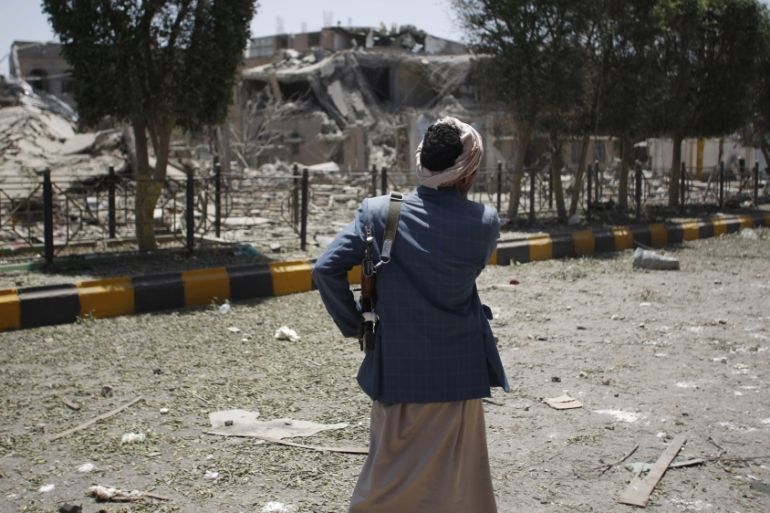The psychological cost of Yemen’s war
While facing shortages in food and water needs, many in Yemen also suffer from the mental trauma of war.

Sanaa, Yemen – West of the capital Sanaa, an old school converted into a displaced persons’ centre in May gives shelter to Samira Musleh and her 11 family members, who were all displaced from their family home during the ongoing violence in Yemen, where the World Health Organization estimates 2,800 have died since March.
The family must grapple with shortages in basic needs like food and hygiene products. Yet Samira, 38, must also contend with a less visible trace of the war: psychological trauma.
Keep reading
list of 4 items‘Mama we’re dying’: Only able to hear her kids in Gaza in their final days
Europe pledges to boost aid to Sudan on unwelcome war anniversary
Birth, death, escape: Three women’s struggle through Sudan’s war
On April 20, an air strike hit Samira’s family home in the Sanaa neighbourhood of Atan Mount, leaving the house destroyed and her husband buried under the debris.
Separated from her children and overwhelmed by the sight of her husband’s dead body, Samira fell unconscious. “After around five hours, I found myself in the al-Thawra hospital and my children beside me,” Samira said.
After a month in the hospital, Samira and her family left for the newly converted Adhban school. Unable to secure a place for themselves, they now share the centre – and its supplies – with eight other families. In total, the centre houses around 80 people.
Though Samira lives in safer conditions, remnants of the day continue to haunt her.
Since the incident, Samira’s family has noticed a drastic shift in her behaviour, but do not know from what, exactly, she is suffering.
She was diagnosed with post-traumatic stress disorder by a doctor and was given medicine, but treatment soon fell by the wayside once her prescription ran out. Now, Samira is more preoccupied with the immediate, physical needs of food and hygiene.
![The Adhban centre has become a festering site for the psychological trauma among some of Yemen's civilian victims [AP]](/wp-content/uploads/2015/06/bec4955ee94640038125ecf9467c9a8c_18.jpeg)
As it attempts to fulfil the needs of displaced people, the Adhban school centre has become a festering site for the psychological trauma among some of Yemen’s civilian victims.
Witnessing the damage and violence of the conflict has had a profound effect on children like Fuad Hilal, 8, whose family is now strung across the faultline of displacement after having been driven from their home in the neighbourhood of Atan.
Hoping to leave the centre, Fuad’s father spends his days looking for a new home, leading to Fuad feeling neglected and his already traumatised mental state deteriorating.
Fuad’s father, Mohammed, said that Fuad currently suffers from nightmares, stuttering, and bed-wetting, but
Treating people that suffer from psychological trauma is not one of our priorities. We are just looking to provide food and clothes for displaced people through different organisations … and charity associations.
claimed that the resilience of childhood will help his son overcome his trauma. “I am confident that Allah is the only one that can help us overcome his condition, and I trust that my son will recover,” Mohammed said.
He added that treating his son’s mental health could not become a priority, because Fuad and his six siblings have more basic needs that must be fulfilled.
According to Sami al-Harithi, the centre’s manager, neither local nor international organisations have been making mental health a priority in their aid.
Though organisations like Islamic Relief provide oil, rice, and wheat, the assistant programme manager of its branch in Yemen, Saddam al-Abdini, told Al Jazeera that mental health concerns were not a priority.
The centre itself can do nothing, even as many of its residents attempt to seek help for their conditions.
“Treating people that suffer from psychological trauma is not one of our priorities,” said Harithi. “We are just looking to provide food and clothes for displaced people through different organisations … and charity associations.”
There is only one government-run centre for mental health treatment at Sanaa University; most private centres are too expensive for those taking shelter at Adhban school. While there are also clinics at state-run hospitals like al-Thawra, many complain about its subpar services.
Complicating the centre’s efforts is the occasional intervention of Houthi rebels in the centre’s procedures.
One 36-year-old resident, Saba al-Awlaqi, has been seeking medicine for trauma and shortness of breath, but said that her attempts to do so have been blocked by Houthi rebels preventing her from speaking to outside visitors.
According to Salah al-Deen al-Gomaie, the head of Sanaa University’s psychology department, a continued lack of medical resources for mental support could have adverse effects for the future, especially for children.
“Not all psychological effects can be seen,” added Gomaie. “Some can only be detected by psychologists. This is why there must be a psychological centre in each district in Sanaa to treat victims of trauma.”